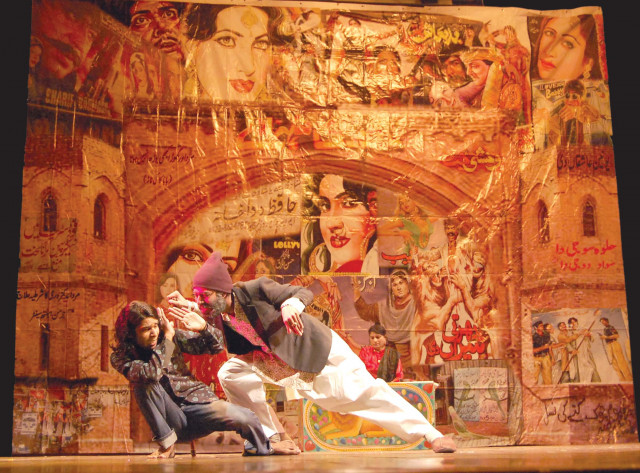For Pakistan of today, Brecht of 1928 still holds true
Ajoka theatre perform charmingly amusing desi rendition of the ‘The three penny opera’, originally based in London.

For Pakistan of today, Brecht of 1928 still holds true
Staged by the Ajoka theatre at the Pakistan National Council of the Arts, the Brecht theatre festival in memory of the German dramatician Bertol Brecht, adapts the playwrights works, infusing it with indigenous colour to produce in this case a romp that, though an adaptation (of The Three Penny Opera to be exact), is decidedly its own little creation, a wonderful hodgepodge.
Adapted by Shahid Nadeem and directed by Madeeha Gauhar, the play opens up with a soliloquy from the wizened Abdul Faqeer (pun intended), a Fagin-type character who runs a ‘mentoring programme’ for up-and-coming beggars. His monologue covers nearly every vice that goes on in the district, his croaky, tongue-in-cheek rambling, like a precursor to the rest of the play.
His rival and soon to be son-in-law, Fooka Terror, is a typical Punjabi gangster, loud and raffish with cronies and policemen sitting comfortably in his pocket. A dramatic twist brings Abdul Faqeer’s daughter, Peeno, into the mix. She falls in love with Terror and marries him. This does not sit well with her criminal parents and they soon hatch a scheme to unravel their daughter’s espousal and Terror’s reign.
This play is fun. If it does not have you amused, which is unlikely, it’ll certainly have you charmed. This seeming Lollywood-esque plot, though originally based in the Soho district of London, would have on its own, fallen through being a mere rehash. But it does not.
The strength of the writing, stripping away the plays original trappings and reimaging it in a local setting is an inspired move. Adaptations often flounder for their inability to rise above the source material, as if chained. But to the production’s credit, Brecht has been given a Pakistani warp; his recurring critique and disavowal of societies is extremely pertinent commentary today. Regardless of the fact that the original was written nearly a century ago, the play’s lashing tongue is as relevant as it was then in 1928, and when Ajoka first took it up in 1991 and again this year. The policemen of these streets are heartily corrupt, the clergy, literally blind and self serving. No one is innocent, even degrees inexistent.
The play is superbly composed, nary a weak link in the show. Time has afforded the production well, it being presented in near-perfect form. A slight detraction though, a foible, is the play’s dependence on its song and dance numbers, excessive in a play that clocks nearly two and a half hours. Though catchy and upbeat, the routines tend to take away from otherwise electric work on stage - this jumble, stretching the play needlessly.
The acting is top notch, with particular appreciation for Usman Zia, who plays Abdul Faqeer. Theatre in Islamabad can take a page from such a production and learn a thing or two. It is refreshing after seeing so many dregs.
Published in The Express Tribune, January 16th, 2011.



















COMMENTS
Comments are moderated and generally will be posted if they are on-topic and not abusive.
For more information, please see our Comments FAQ